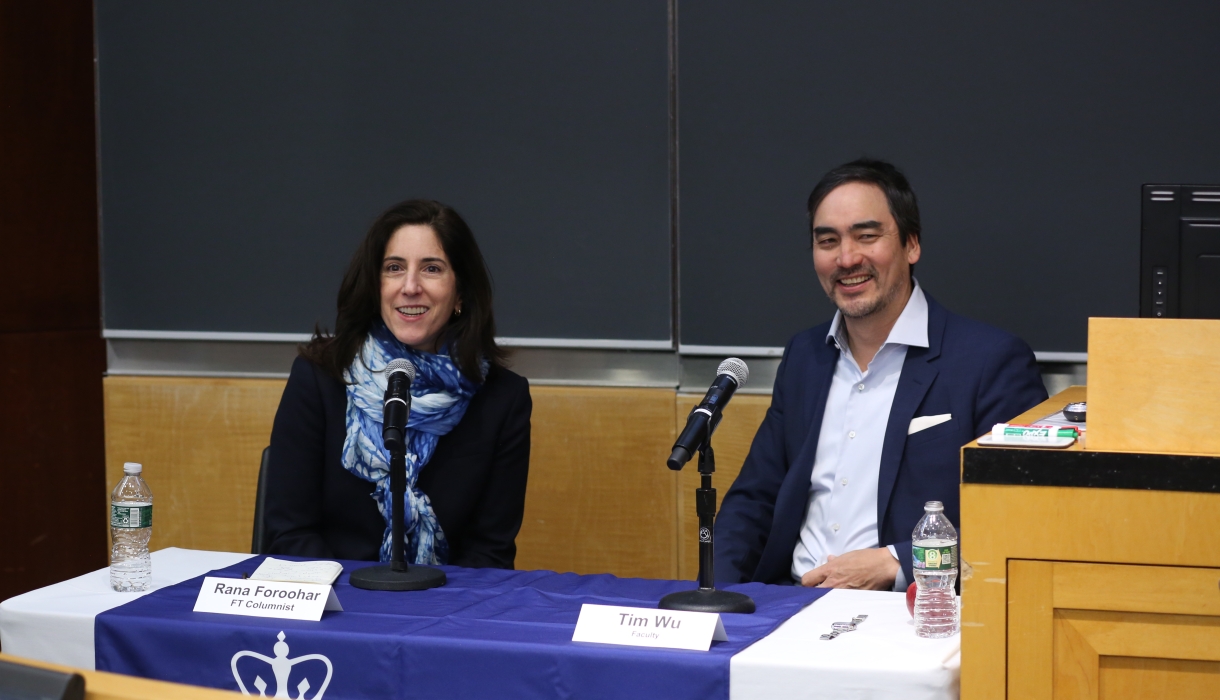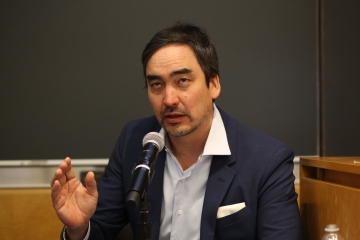How to Change 40 Years of Policy in 22 Months: Professor Wu in Washington
As he resumes teaching at Columbia Law School, after spending nearly two years in the Biden administration, antitrust and tech scholar Tim Wu talks about his work to overhaul competition policy and his hopes for lasting change—despite Congress.

An expert on antitrust and Big Tech and author of The Curse of Bigness: Antitrust in the New Gilded Age, Timothy Wu, Julius Silver Professor of Law, Science and Technology, joined the Biden administration in 2021 as special assistant to the president for technology and competition policy. At a Lawyers, Community, and Impact event in January (pictured above), Wu sat down with Financial Times columnist Rana Foroohar to discuss the sea change in competition policy driven by Biden administration appointees, including Federal Trade Commission Chair Lina Khan (on leave from the Columbia Law faculty). Below are excerpts from his comments (edited for clarity).
In July 2021, President Joe Biden signed an executive order on competition policy, pushing federal regulators to go after issues such as noncompete agreements, occupational licensing requirements, and information-sharing by employers about worker pay. How did that come about, and how were you involved?
That was, over the long term, the most significant thing I did. The executive order on competition was an effort to put down a marker. We felt very strongly that the president should declare his and the administration’s policy preferences when it came to competition policy in the antitrust law. This was in some ways a reaction to two trends. First was the direction of antitrust law and competition policy over the past 40 years, which had moved to a narrowly focused, essentially Chicago School-inspired approach fixated on [assessing potential] consumer harms.
But there was something else going on which is more institutional. The antitrust law competition policy is, in my view, one of the major levers that the federal government has over the economy. How you set competition policy helps set things like how concentrated the economy is going to be and what the structure of the economy looks like. Do you have industries that are generally dominated by two or three big companies, or do you have six, seven, eight in more competitive markets? Are big companies generally allowed to buy their up-and-coming competitors, or do they have to wait it out and try to fight them off? These are important levers.
In the executive order, we wanted to turn the page on 40 years. We linked the new policy to Theodore Roosevelt and Franklin D. Roosevelt, who believed very strongly that antitrust had a broad role to play in the economy. It was very important for serving goals like the equality of the economy, the sense of fairness. And it was meant to serve not just consumers but also workers, small businesses, and farmers. If you read the history of antitrust law, that is what [the law] is about.
Where did you find surprising allies or surprising resistance?
One of the more surprising alliances, given the history of competition antitrust, was labor unions. There had traditionally been a divide because the antitrust law, early in its history, was used to attack unions as a cartel. I don’t know if organized labor has 1,000% embraced every single part [of the competition policy], but they were on board.
Other unexpected allies were farmers, who are very angry about the meat industry’s concentration.
Maybe the biggest unexpected ally—I’ll say this carefully—was President Biden.
I would not say that he was, in his congressional career, an antitrust true believer. But in office, he embraced it. President Biden came into this presidency as someone who felt that there was a great power imbalance in this country—too much power moved to the coasts, too much wealth in a small elite—and he wanted to do something. He saw antitrust as a tool, and he embraced it.
A lot of policymaking over the past 40 years has been done at a very technocratic level, at an expert level. When you were in the White House digging in the weeds and talking to folks from federal agencies, how did you get from the Chicago School idea to this new idea?
At some point [the new competition policy] became one of the pillars of the Biden economic program [namely: moving goods cheaper and faster, reducing everyday costs, promoting competition, and eliminating barriers to jobs]. I had to sell it to get it up to that level. We also convinced the president to convene a cabinet meeting on competition policy every six months so that the cabinet secretaries could have a sense of accountability. That was part of the institutionalization of the policy: If people feel they have a meeting with the president coming up, they tend to take things more seriously.
In terms of pitching the president on this, it was about making it concrete and real for a broad group of Americans. For example, in one of the signature initiatives in the executive order, we suggested that the FTC ban noncompete contracts. (Those are agreements that you sign that say, if I quit this job, I’m not going to work for any competitor.) A waitress working at Denny’s gets a better offer from another diner across the street, she can’t take the job. It seems so at odds with the basic promise of American economic liberty and opportunity. That was the kind of thing that meant more to people than a technocratic argument: “We might increase productive efficiency if we manage to moderate the cartel practices in this area.”
How do you see the [approach to competition] progressing over the next few years and the next couple of decades?
The bet has to be that these policies resonate and last. And one would have to hope they also start to transcend parties because the [federal] agency culture lasts much longer than any individual administration. So there’s winning elections with these kinds of [policies], but there’s also transforming the culture of what’s taken for granted and what the starting point for economic policy is in Washington, D.C.
Any regrets about your time in Washington?
There was a golden opportunity to pass comprehensive privacy legislation. If you poll the American public, probably 70%, 80% want it. There was also child privacy protection, which probably 90% to 95% of people want. I came into this job a little cynical about Congress—I am now ten times more cynical. It’s a shameful institution in terms of their representation of the American public. There are so many things that the American people want that Congress will not give them, and they’re supposed to be a democratically accountable body.
This interview has been edited and condensed.
